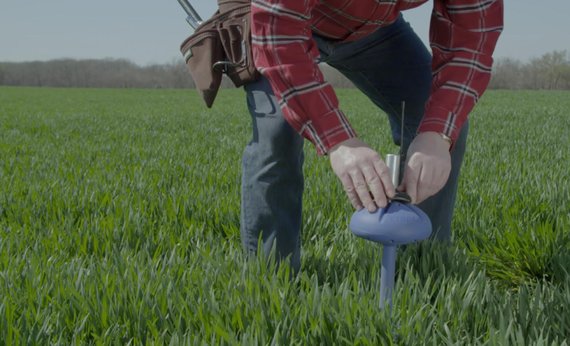Sensors such as this one sold by CropX are part of the push for greater precision in agricultural operations.
Three sensors. That's how many $380 soil monitoring devices sold by smart agriculture upstart CropX it takes to measure keep tabs on the water needs of a standard 125-acre farming plot.
"You don't need tens of sensors across a large field," CropX CEO Isaac Bentwich, a veteran of multiple biotech and data analytics ventures, said in an interview. "I believe that ag tech is the new biotech. It's really the exciting frontier of our time."
Bentwich is far from alone in his pursuit of improved agricultural efficiency in the face of increasing drought risk and food insecurity.
But unlike fellow precision ag companies focused on drone imaging of crops (Vine Rangers, Aeroharvest) or working to turn underused urban spaces into hubs for food production (Freight Farms, AeroFarms, Edenworks), 9-month-old CropX is focused on building "the Internet of Soil." At the core of the CropX model is the premise that farmers can cut water use up to 30 percent by discouraging blanket irrigation and pinpointing pockets of soil that need more or less water.
Sure, there's now an Internet for all kinds of things -- cars, buildings, etc. -- but the idea with agriculture is to realize resource savings and greater food productivity through a combination of in-ground sensors and cloud analytics tools. For CropX, the analytics come in the form of soil monitoring and the capability to adjust irrigation levels with the help of a $220-a-year subscription software service.
As of this week, the company's approach to connected farming has attracted a pair of new big backers. Large sensor manufacturers Bosch and Flex (formerly Flextronics) are betting on the company's ability to realize concrete value in the rush toward abstract Internet of Things-enabled connectivity.
Innovation and investment arms of both companies have contributed to a total $10 million Series A funding round, which also includes the likes of former Google CEO Eric Schmidt's Innovation Endeavors, ag tech investor Finistere Ventures and GreenSoil Investments.
How the technology ultimately could be leveraged by both Bosch and Flex is also in question. Robert Bosch Venture Capital GmbH (RBVC) is the venture capital arm of the German manufacturing giant, perhaps best known for its role as an auto industry supplier. Flex, meanwhile, invested in CropX through its Lab IX technology accelerator amid a gambit to expand beyond PC and electronics manufacturing by getting in on the intelligent device craze.
"Population growth and shifting regional economies are driving increases in global food demand," said Jeannine Sargent, president of Innovation and New Ventures at Flex, in a statement highlighting the company's interest in "bringing digital intelligence to today's agricultural industry."
Precision agriculture is expected to be a nearly $5 billion business by 2020, while the broader Internet of Things rush is projected to unleash value upwards of $1 trillion by 2020, according to one recent estimate from research firm IDC.
By backing CropX, Bosch and Flex are also indirectly competing with another corporate titan interested in precision agriculture: Monsanto. After acquiring ag tech company the Climate Corporation two years ago for roughly $1 billion, the agrochemical giant now sells field monitoring technology that promises to help farmers "understand yield-limiting factors."
Bentwich doesn't have anywhere near the potential reach of Monsanto, but he does expect the company to grow its footprint fortyfold this year. The company launched with about 5,000 acres last year.
"Analytics is really the queen of disruptive technologies. This is true in all industries and is now happening in agriculture," he said. "When you deal with life science, if you want to do analytics that really excel, you have to touch the biology."
Although buyer adoption and concerns such as data privacy or cybersecurity continue to hang over connected devices across industries, Bentwich said CropX is projecting growth this year thanks to growth among both retail customers who can install the devices on their own farms and bigger corporate food companies.
PepsiCo, for instance, is an indirect investor in the company interested in how to optimize the water required to grow common crops such as potatoes.
Ultimately, the pursuit of tech-enhanced resource conservation also could lead CropX to sectors farther afield from row crops. The sensor and software combination ultimately also could be applied to golf courses, greenhouses or a broader class of commercial and residential properties.
"Once you solve the infrastructure of sensors and communication, adding additional sensors is the easier part," Bentwich said.

